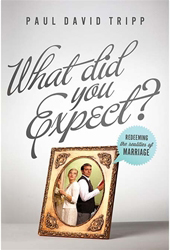
Trust makes you willing to take risks
and allows you to risk being willing.
We continue this month looking at Paul Tripp’s book “What Did You Expect?” These are primarily excerpts from his book. I strongly recommend reading his book to get the full benefit of his message. You can click on the book image to the right to purchase the book.
No escaping the need for trust
Like any word, trust can mean different things to different people. Let’s start by defining what trust is, and then explore what that might look like in a marriage relationship.
Trust is being so convinced that you can rely on the integrity, strength, character, and faithfulness of another that you are willing to place yourself in his or her care.
Now, think about this definition in the context of marriage. When you say your vows in front of God, your family, and your friends, you are making a commitment to place yourself in the care of the other person and to care for him or her in return. One of the essential foundation stones of marriage is trust. If there’s no trust, there’s no marriage—at least, not the kind of marriage that God designed when he created this lifelong relationship. You can have cohabitation without trust. You can have relational stalemate without trust. But you cannot have the intimate, vulnerable, mutually cooperative, one-flesh union that marriage is intended to be without trust.
You must be able to take your spouse at face value. You must be comfortable when he or she is not in your eyesight. You must not worry whether he is being honest or will be faithful to his promises. You must not fear that she cares for herself more than she cares for you. You must never wonder if there is someone else who has captured his interest and/or affection. You must never worry for your well-being or safety. You must not be afraid to stick your neck out and be vulnerable. You must not fear that you will be taken advantage of or used in any way.
Trust is about rest, peace, security, and hope. Trust allows you to face the worst and hope for the best. Trust makes you feel safe and makes it safe for you to share your feelings. Trust allows you to speak honestly and to listen to the honesty of your spouse. Trust lets you know that you are cared for and causes your care to be known. Trust causes you to look out for your spouse’s interest while resting in the fact that they will look out for you. Trust is about being good for your word and about being committed to do only what is good. Trust means doing anything you can to let your spouse know that she can be confident in entrusting herself to your care.
Where the rubber meets the road
To help you reflect on how trust is functioning in your marriage, ask yourself these questions (I have listed only a few here, but you can see all 22 questions in Paul Tripp’s book featured at the top of this page)…
Is there more unity, understanding, and love in your marriage now,
than there has ever been?
Perhaps this is the best indicator of all. When there is a strong bond of trust, the intimacy of marriage grows. Trust allows a couple to work through differences and build unity. Trust allows you to work to understand your spouse and to know that he or she will work to understand you. When your spouse proves that they care about you enough to demonstrate to you that they can be trusted, your respect and affection for them will grow. This does not mean that your marriage will be free of difficulty. remember, you do live in a fallen world, and you do live with a flawed person. Trust won’t alleviate all of your problems and differences, but it will give you the means of dealing with them.
Do you do what you say you will do?
Like it or not, you must face the fact that how well you follow through with keeping your word will function as a barometer of your trustworthiness to your spouse. And this is how it should be. If you love your spouse you will take seriously the things you commit to and keep your word. Unfortunately, sometimes we don’t pay that much attention to the things we commit to because we consider them insignificant or trivial. Remember what we established in earlier discussion: the character of a marriage is not built on merely three or four significant moments. No, the character of a marriage is established through ten thousand little moments. It is the character that is built in the little moments that you carry into the big moments of life (Luke 16:10). Trust is built moment by moment and day by day. It is the degree of your daily reliability that tells your spouse that you are a person who can be trusted or not.
Do you make excuses for failing to keep your word, or are you ready to take responsibility and confess?
Self-righteousness, inapproachability, defensiveness, and self-excusing are all toxic to trust. You will not entrust yourself to your spouse if they are defensive and unapproachable. You will not trust your spouse if, in time of failure, they are not willing to look at themselves and take some responsibility for their part in the conflict. Trust doesn’t demand perfection. Trust demands humility. Self-defensiveness says that you are more interested in being right than working together to build a relationship of unity, understanding, and love. Humble openness, combined with the commitment to admit and confess wrongs, is an essential ingredient of a bond of trust.
Is your marriage partner the best friend in your life, or has your dream of this kind of companionship evaporated?
Marriage really is a human covenant of companionship. God wasn’t so much giving Adam a physical helper for the work in the garden as he was giving him a companion. You could argue that this is the most basic reason for marriage. The character and quality of the friendship between a husband and wife always functions as an accurate measure of the health of their marriage. It is also an accurate barometer of trust. When trust is present between two people, their appreciation and affection will grow, and as these things grow, friendship flourishes.
Do you ever wonder if your spouse cares for themselves more than for you?
Remember our definition of trust at the start of this post: Trust is being so convinced that you can rely on the integrity, strength, character, and faithfulness of another that you are willing to place yourself in his or her care. Don’t be willing to live in a marriage where trust has died. Commit yourself to doing the hard work necessary to build that relationship of trust. Believe that God will never call you to do a thing without giving you the means to accomplish it. His grace will take you places you hadn’t intended to go, but it will produce in you things that you could never produce on your own.
Next month we continue looking at Commitment 4: We will commit to building a relationship of love.
[divider]
Paul David Tripp is the president of Paul Tripp Ministries, a nonprofit organization, whose mission statement is “Connecting the transforming power of Jesus Christ to everyday life.” This mission leads Paul to weekly speaking engagements around the world. In addition to being a gifted communicator Paul is the Executive Director of the Center for Pastoral Life and Care in Fort Worth, Texas, and has taught at respected institutions worldwide. Paul has written twelve books on Christian Living that are read and distributed internationally, including Instruments in the Redeemer’s Hands; War of Words; Broken Down House; and Crossway’s Whiter Than Snow. Get more information or purchase the book ”What Did You Expect?” He has been married for many years to Luella and they have four grown children. For more information and resources visit paultrippministries.org.











Leave A Comment
You must be logged in to post a comment.